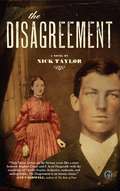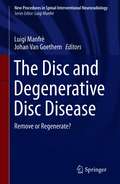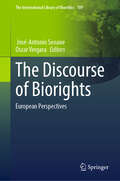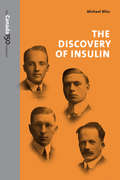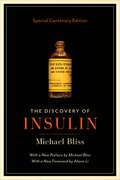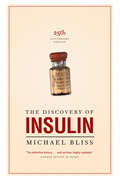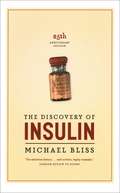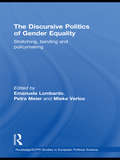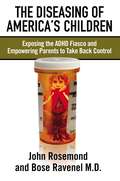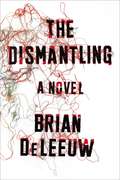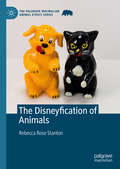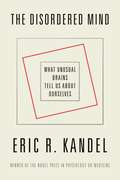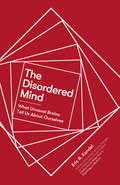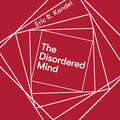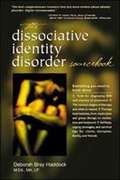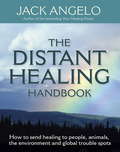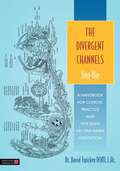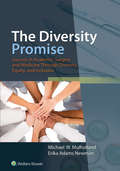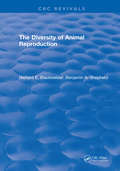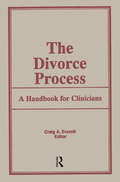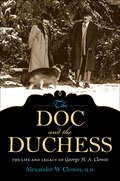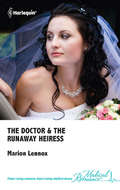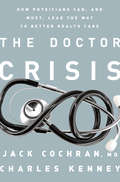- Table View
- List View
The Disagreement
by Nick TaylorIt is April 17, 1861 -- the day that Virginia secedes from the Union and the sixteenth birthday of John Alan Muro. As the Commonwealth erupts in celebration, young Muro sees his dream of attending medical school in Philadelphia shattered by the sudden reality of war. Muro's father, believing that the Disagreement will pass, sends his son instead to Charlottesville. Jefferson's forty-year-old University of Virginia has become a haven of rogues and dilettantes, among them Muro's roommate, Braxton Baucom III, a planter's son who attempts to strike a resemblance to General "Stonewall" Jackson. Though the pair toasts lightheartedly "To our studies!" with a local corn whiskey known as "The Bumbler," the war effort soon exerts a sobering influence. Medical students like Muro are pressed into service at the Charlottesville General Hospital, where the inexperienced Dr. Muro saves the life of a Northern lieutenant, earning the scorn of his peers. As the war progresses, Muro takes up yet another cause -- winning the affections of the beguiling Miss Lorrie Wigfall. Here, too, Muro faces a cunning adversary. Just as the fighting is closing in, Muro is forced to make a choice that will shape the rest of his life. In this story of love, loyalty, and unimaginable sacrifice, a doctor struggles to balance the passions of youth with the weight of responsibility.
The Disc and Degenerative Disc Disease: Remove or Regenerate? (New Procedures in Spinal Interventional Neuroradiology)
by Luigi Manfrè Johan Van GoethemThis easy-to-consult guide examines the most advanced techniques in the radiological evaluation of the disc and degenerative disc disease, using conventional, functional, dynamic and advanced imaging. It provides clear information on a range of CT, X-ray, and MRI guided techniques, presents all disc treatments in connection with symptomatic disc herniations, evaluates conservative, chemical (ESI, steroid, Ozone, ethanol gel injections) and physical treatments (coblation, laser, decompressors, endoscopy), and assesses the possibility of repairing and/or regenerating the disc in the context of reversible disc degeneration. Like other books in the Springer series New Procedures in Spinal Interventional Neuroradiology, this practice-oriented volume will fill a significant gap in the literature and meet the need expressed by many specialists (interventional neuroradiologists and radiologists, neurosurgeons, and orthopedists) for a topical and handy guide that specifically illustrates the currently available materials and methods.
The Discourse of Biorights: European Perspectives (The International Library of Bioethics #109)
by José-Antonio Seoane Oscar VergaraThis book provides answers to the questions that biomedical and biotechnological research has posed to our societies by proposing the introduction of biorights. It shows how bioscience affects our individual and social lives by discussing and answering important questions such as; Are we becoming more vulnerable and unable to protect ourselves? How can we ensure fairness and justice with regards to the access to health care? Are human dignity, autonomy and equality at risk? Do we need new and special rights: neurorights, genetic rights? What is the meaning and scope of the right to life, health, privacy or non-discrimination? Biorights are the suggested solution for dealing with these challenges. Healthcare professionals, bio-researchers, policy makers, scholars, and citizens will, in this book, find a guide to knowing how bioscience affects our lives. Furthermore, this book provides a comprehensive method for biomedical and biotechnological decision-making that comprises human or basic rights dimensions alongside technical and ethical dimensions. Chapters 1, 12 and 18 are available open access under a Creative Commons Attribution 4.0 International License via link.springer.com.
The Discovery of Insulin
by Michael BlissWhen insulin was discovered in the early 1920s, even jaded professionals marveled at how it brought starved, sometimes comatose diabetics back to life. In the twenty-fifth-anniversary edition of a classic, Michael Bliss unearths scientists' memoirs and confidential appraisals of insulin by members of the Nobel Committee. He also resolves a longstanding controversy about scientific collaboration at its most fractious and fascinating: who ultimately deserves credit for the discovery? Bliss's life-and-death saga illuminates one of the most important break throughs in the history of medicine. Book jacket.
The Discovery of Insulin
by Michael BlissThe discovery of insulin at the University of Toronto in 1921-22 was one of the most dramatic events in the history of the treatment of disease. Insulin was a wonder-drug with ability to bring patients back from the very brink of death, and it was no surprise that in 1923 the Nobel Prize for Medicine was awarded to its discoverers, the Canadian research team of Banting, Best, Collip, and Macleod. In this engaging and award-winning account, historian Michael Bliss recounts the fascinating story behind the discovery of insulin – a story as much filled with fiery confrontation and intense competition as medical dedication and scientific genius. Originally published in 1982 and updated in 1996, The Discovery of Insulin has won the City of Toronto Book Award, the Jason Hannah Medal of the Royal Society of Canada, and the William H. Welch Medal of the American Association for the History of Medicine.
The Discovery of Insulin: Special Centenary Edition
by Michael BlissThe discovery of insulin at the University of Toronto in 1921–2 was one of the most dramatic events in the history of the treatment of disease. Insulin, discovered by the Canadian research team of Frederick Banting, Charles Best, James Collip, and John Macleod, was a wonder drug with the ability to bring diabetes patients back from the brink of death. It was no surprise that in 1923 the Nobel Prize for Medicine was awarded for its discovery. In this engaging and award-winning account, historian Michael Bliss draws on archival records and personal adventures to recount the fascinating story behind the discovery of insulin – a story as much filled with fiery confrontation and intense competition as medical dedication and scientific genius. With a new preface by Michael Bliss and a foreword by Alison Li, the special centenary edition of The Discovery of Insulin honours the one hundredth anniversary of insulin’s discovery and its continued significance a century later.
The Discovery of Insulin: The Twenty-fifth Anniversary Edition
by Michael BlissThe discovery of insulin at the University of Toronto in 1921-22 was one of the most dramatic events in the history of the treatment of disease. Insulin was a wonder-drug with ability to bring patients back from the very brink of death, and it was no surprise that in 1923 the Nobel Prize for Medicine was awarded to its discoverers, the Canadian research team of Banting, Best, Collip, and Macleod. In this engaging and award-winning account, historian Michael Bliss recounts the fascinating story behind the discovery of insulin – a story as much filled with fiery confrontation and intense competition as medical dedication and scientific genius. Originally published in 1982 and updated in 1996, The Discovery of Insulin has won the City of Toronto Book Award, the Jason Hannah Medal of the Royal Society of Canada, and the William H. Welch Medal of the American Association for the History of Medicine.
The Discovery of Insulin: Twenty-fifth Anniversary Edition
by Michael Bliss“The new edition of this historical masterpiece . . . fleshes out events and personalities through a narrative that remains as stirring and relevant as ever.” —Robert A. Hegele, Western UniversityWhen insulin was discovered in the early 1920s, even jaded professionals marveled at how it brought starved, sometimes comatose diabetics back to life. In the twenty-fifth anniversary edition of a classic, Michael Bliss unearths scientists’ memoirs and confidential appraisals of insulin by members of the Nobel Committee. He also resolves a longstanding controversy about scientific collaboration at its most fractious and fascinating: who ultimately deserves credit for the discovery? Bliss’s life-and-death saga illuminates one of the most important breakthroughs in the history of medicine.“The Discovery of Insulin deserves a place on the bookshelf alongside such eye-openers as James Watson’s The Double Helix.” —Washington Post“The definitive history . . . well written, highly readable.” —London Review of Books“Scrupulously researched and compellingly readable . . . I wholeheartedly recommend it to anyone with an interest in diabetes, medical history, or medical scandal and gossip.” —British Medical Journal“This book reaches well beyond the story of insulin. It is a timeless chronicle on the pursuit of science, as well as the nature of discoveries and the people who make them.” —Jeffrey M. Friedman, Marilyn M. Simpson Professor, The Rockefeller University, and Investigator, Howard Hughes Medical Institute
The Discursive Politics of Gender Equality: Stretching, Bending and Policy-Making (Routledge/ECPR Studies in European Political Science)
by Emanuela Lombardo Mieke Verloo Petra MeierThis book explores the discursive constructions of gender equality and the implications of these understandings in a broad range of policy fields. Using gender equality as a prime example, a number of internationally renowned scholars offer a new vocabulary to identify and study processes of the reduction, amplification, shifting or freezing of meaning. The main aim of the book is to understand the dynamics and to reflect on the consequences of such discursive politics in recent policy making on gender equality. It explores both the potential opportunities that are opened up for the promotion of equality through discursive politics, and the limitations they impose. Distinctive features of the volume include: chapters covering a range of case studies in Europe, the USA, and the Asia region, tackling contemporary political debates on equality new insights of relevance to public policy practices such as gender mainstreaming, with theorizing on intersecting inequalities The Discursive Politics of Gender Equality will be of interest to students and scholars, of political science, public policy, comparative politics, gender and women studies.
The Diseasing of America's Children: Exposing the ADHD Fiasco and Empowering Parents to Take Back Control
by John Rosemond Bose RavenelHow parents, teachers, and even professionals are being deceived by the "ADHD Establishment" regarding ADHD and other childhood behavior disorders and the drugs used to treat them. The issue of diagnosing children with behavioral diseases that do not conform to a scientific definition of disease, and then medicating them is a scandal ready to erupt. In The Diseasing of America's Children, popular family psychologist, speaker and best-selling author John Rosemond joins with pediatrician Dr. Bose Ravenel to uncover the fiction and fallacy behind attention-deficit/hyperactivity disorder (ADHD), oppositional defiant disorder (ODD), early-onset biopolar disorder (EOBD), and the drugs prescribed to treat them. Rosemond and Ravenel will: reveal the pseudo-science behind these diagnoses; explain how parents, teachers, and even professionals are deceived; expose the short- and long-term dangers behavioral drugs pose to children; discuss how America's schools are unwittingly feeding the diagnostic beast; reveal the simple, common sense truth behind these behavior problems and give parents a practical program for curing these problems without drugs or dependence on professionals.
The Dismantling
by Brian DeleeuwHow much of yourself are you willing to sell?Brian DeLeeuw hits that sweet spot between literary and commercial suspense with his brilliantly adept, ingeniously plotted novel--a chilling, fast-paced drama that urges readers to question the meaning of atonement and whether revenge might sometimes be the only way we can liberate ourselves from our past.Twenty-five-year-old med school dropout Simon Worth is an organ broker, buying kidneys and livers from cash-strapped donors and selling them to recipients whose time on the waitlist is running out. When a seemingly straightforward liver transplant has an unexpectedly dangerous outcome, Simon finds himself on the run. In order to survive, he must put aside his better moral judgment and place his trust in a stranger who has a shocking secret.From the Trade Paperback edition.
The Disneyfication of Animals (The Palgrave Macmillan Animal Ethics Series)
by Rebecca Rose StantonThis book critically examines how Walt Disney Animation Studios has depicted – and sometimes failed to depict – different forms of harming and objectifying non-human animals in their films. Each chapter addresses a different form of animal harm and objectification through the theories of speciesism, romanticism, and the ‘collapse of compassion’ effect, from farming, hunting and fishing, to clothing, work, and entertainment. Stanton lucidly presents the dichotomy between depictions of higher order, anthropomorphised and neotonised animal characters and that of lower-order species, showing furthermore how these depictions are closely linked to changing social attitudes about acceptable forms of animal harm. An engaging and novel contribution to the field of Critical Animal Studies, this book explores the use of animals not only in Disney’s best known animated films such as 101 Dalmatians, but also lesser known features including Home on the Range and Fun and Fancy Free. A quantitative appendix supplying data on how often each animal species appears and the amount of times animal harm or objectification is depicted in over fifty films provides an invaluable resource and addition to scholars working in both Disney and animal studies.
The Disordered Mind: What Unusual Brains Tell Us About Ourselves
by Eric R. KandelEric R. Kandel, the winner of the Nobel Prize in Physiology or Medicine for his foundational research into memory storage in the brain, is one of the pioneers of modern brain science. His work continues to shape our understanding of how learning and memory work and to break down age-old barriers between the sciences and the arts.In his seminal new book, The Disordered Mind, Kandel draws on a lifetime of pathbreaking research and the work of many other leading neuroscientists to take us on an unusual tour of the brain. He confronts one of the most difficult questions we face: How does our mind, our individual sense of self, emerge from the physical matter of the brain? The brain’s 86 billion neurons communicate with one another through very precise connections. But sometimes those connections are disrupted. The brain processes that give rise to our mind can become disordered, resulting in diseases such as autism, depression, schizophrenia, Parkinson’s, addiction, and post-traumatic stress disorder. While these disruptions bring great suffering, they can also reveal the mysteries of how the brain produces our most fundamental experiences and capabilities—the very nature of what it means to be human. Studies of autism illuminate the neurological foundations of our social instincts; research into depression offers important insights on emotions and the integrity of the self; and paradigm-shifting work on addiction has led to a new understanding of the relationship between pleasure and willpower.By studying disruptions to typical brain functioning and exploring their potential treatments, we will deepen our understanding of thought, feeling, behavior, memory, and creativity. Only then can we grapple with the big question of how billions of neurons generate consciousness itself.
The Disordered Mind: What Unusual Brains Tell Us About Ourselves
by Eric R. KandelNeurological and psychiatric disorders have long been regarded as fundamentally different, depending on whether they appear to affect the brain or the mind. In reality, the brain and the mind are inseparable. Both types of disorder can affect every aspect of brain function: from perception, action, memory and emotion to empathy, social interaction, attention and consciousness. It is easy to view brain disorders as simply tragic or frightening. However, studying where these functions go wrong provides a window on the workings of the healthy brain, and makes it more likely that scientists and clinicians will be able to develop effective treatments or preventative strategies. As individuals, and as a society, we are also able to better empathise with people with disorders of the mind.Building on his pioneering research, Eric R. Kandel illustrates how breakthrough studies of brain disruptions can deepen our understanding of thought, feeling, behaviour, memory and creativity, and perhaps in the future will transform medical care and lead to the development of a unified theory of mind.
The Disordered Mind: What Unusual Brains Tell Us About Ourselves
by Eric R. Kandel'[Kandel's discoveries] have truly changed our understanding of brain function' - Citation for the Nobel Prize in Physiology or Medicine'[Eric Kandel is] one of the preeminent neuroscientists in the world' - Sue Halpern, The New York Review of Books Highly commended at the British Medical Association Book Awards 2019Neurological and psychiatric disorders have long been regarded as fundamentally different, depending on whether they appear to affect the brain or the mind. In reality, the brain and the mind are inseparable. Both types of disorder can affect every aspect of brain function: from perception, action, memory and emotion to empathy, social interaction, attention and consciousness. It is easy to view brain disorders as simply tragic or frightening. However, studying where these functions go wrong provides a window on the workings of the healthy brain, and makes it more likely that scientists and clinicians will be able to develop effective treatments or preventative strategies. As individuals, and as a society, we are also able to better empathise with people with disorders of the mind.Building on his pioneering research, Eric R. Kandel illustrates how breakthrough studies of brain disruptions can deepen our understanding of thought, feeling, behaviour, memory and creativity, and perhaps in the future will transform medical care and lead to the development of a unified theory of mind.
The Dissociative Identity Disorder Sourcebook (Sourcebooks)
by Deborah HaddockFrom Eve to Sybil to Truddi Chase, the media have long chronicled the lives of people with dissociative identity disorder (DID), formerly known as multiple personality disorder. The Dissociative Identity Disorder Sourcebook serves as a much-needed bridge for communication between the dissociative individual and therapists, family, and friends who also have to learn to deal with the effects of this truly astonishing disorder.
The Distant Healing Handbook: How to send healing to people, animals, the environment and global trouble spots
by Jack AngeloTHE DISTANT HEALING HANDBOOK is an important book from the UK's leading healing teacher, Jack Angelo. Jack explains that we all have it in our power to take action, to reach out and help people, places and animals who are in need. Extraordinary case histories reveal the beneficial effect distant healing can have. Step-by-step, using over 60 easy-to-follow exercises, Jack shows you how to access your own distant healing power and harness your love and energy for the good of others. THE DISTANT HEALING HANDBOOK will enable you to: Sense your energy field and send healing to people at any distance; Work on your own or with a group or healing circle; Learn advanced, astral level healing; Work with the environment, plants and animals; Send light to trouble spots and disaster areas around the world; Practise unconditional love and bring healing into your everyday life. THE DISTANT HEALING HANDBOOK is a book everyone can use, whether you already have a healing gift or whether you simply want to learn how to send healing and make a difference to a loved one, a pet or to the world we live in.
The Distant Healing Handbook: How to send healing to people, animals, the environment and global trouble spots
by Jack AngeloTHE DISTANT HEALING HANDBOOK is an important book from the UK's leading healing teacher, Jack Angelo. Jack explains that we all have it in our power to take action, to reach out and help people, places and animals who are in need. Extraordinary case histories reveal the beneficial effect distant healing can have. Step-by-step, using over 60 easy-to-follow exercises, Jack shows you how to access your own distant healing power and harness your love and energy for the good of others. THE DISTANT HEALING HANDBOOK will enable you to: Sense your energy field and send healing to people at any distance; Work on your own or with a group or healing circle; Learn advanced, astral level healing; Work with the environment, plants and animals; Send light to trouble spots and disaster areas around the world; Practise unconditional love and bring healing into your everyday life. THE DISTANT HEALING HANDBOOK is a book everyone can use, whether you already have a healing gift or whether you simply want to learn how to send healing and make a difference to a loved one, a pet or to the world we live in.
The Divergent Channels - Jing Bie: A Handbook for Clinical Practice and Five Shen Nei Dan Inner Meditation
by David TwickenRooted in the Su Wen and Ling Shu, Dr. Twicken's book integrates Chinese and Taoist medical philosophy, theories, and principles to clearly demonstrate that the Divergent Channels are an essential aspect of the clinical practice of acupuncture. He takes a step-by-step approach to assist practitioners in 'working out' the channels, and shows how this versatile channel system can be used in any acupuncture treatment. Twicken also includes instruction on Five Shen Nei Dan inner meditation to help practitioners gain a more profound emotional and spiritual understanding. With case studies and reference to the classic texts throughout, this book provides a complete resource that will help clinicians understand and use the Divergent Channels in clinical practice. An accessible and comprehensive account of the Divergent Channel system, this book will be a valuable addition to the shelves of students and practitioners of acupuncture and Chinese medicine; taiji and qigong practitioners; and anyone with an interest in Taoist practice.
The Diversity Promise: Success in Academic Surgery and Medicine Through Diversity, Equity, and Inclusion
by Michael W. MulhollandIssues of diversity, equity, and inclusion are of utmost importance in today’s medical schools, and the University of Michigan is at the forefront of effecting change in this key area of medical education. Drs. Michael Mulholland and Erika Newman and the Department of Surgery at the University of Michigan School of Medicine developed the Michigan Promise with the goal of achieving better results and assisting other schools of medicine to make progress in this area, as well. The Diversity Promise: Success in Academic Surgery and Medicine Through Diversity, Equity, and Inclusion discusses the structure and implementation of this innovative program—information that is easily transferrable to any department in a school of medicine.
The Diversity of Animal Reproduction
by Richard E. BlackwelderThis book is primarily a monograph of the reproductive diversity among animals, including protozoans. This diversity is listed for each group in Chapter 6; it is cross-listed by process in chapter 7.
The Divorce Process: A Handbook for Clinicians
by Craig EverettProfessionals who work with divorcing couples and their families will be inspired by this important book on effective clinical assessment and intervention. The book blends a variety of expert contributions--descriptive, theoretical, and empirical--into a practical handbook that focuses on resources for dealing with the anger and pain of parting spouses and disrupted childhoods. A rich array of clinically useful materials is provided. The book covers background theory, marital interaction, the definition of clinical dysfunctions in children of divorce, specific clinical features of childhood developmental levels, post-divorce reorganization, and models of group work.
The Doc and the Duchess: The Life and Legacy of George H. A. Clowes
by Alexander W. ClowesAn “informative and enlightening” biography of a scientist who helped bring insulin to the world, and went on to become a prominent philanthropist (The Franklin Daily Journal).George Henry Alexander Clowes was a pivotal figure in the development of the insulin program at the Eli Lilly Company. Through his leadership, scientists and clinicians at Lilly and the University of Toronto created a unique international team to develop and purify insulin and take the production of this life-saving agent to an industrial scale.This biography, written by his grandson, presents his scientific achievements, and also takes note of his social and philanthropic contributions, which he shared with his wife, Edith. It tells the story of Clowes from his childhood in late Victorian England to his death at Woods Hole on Cape Cod in 1958. Educated in England and Germany, Clowes came to America to join a startup laboratory in Buffalo, where he conducted basic research on cancer and applied research on other disease-related problems. Assuming the position of head of research at Lilly, Clowes was at the center of one of the great discoveries that changed the course of medical history and offered new life to millions of individuals with diabetes and other metabolic disorders. Clowes was also instrumental in the development of other commercial pharmaceutical advances. Devoted to a number of philanthropic causes, Clowes and Edith contributed greatly to the cultural life of his adopted country, a contribution that continues to this day.
The Doctor & the Runaway Heiress
by Marion LennoxDr Darcy Rochester is horrified when `doctor' Ally Westruther sets up her massage business next door. But why does such a talented doctor refuse to practise medicine as well as massage? Why doesn't such a skilled worker have enough money to eat? and why does such a beautiful, caring, passionate woman want nothing to do with love?
The Doctor Crisis: How Physicians Can, and Must, Lead the Way to Better Health Care
by Charles Kenney Jack CochranCalming fears, alleviating suffering, enhancing and saving lives?this is what motivates doctors virtually every single day. When the structure and culture in which physicians work are well aligned, being a doctor is a most rewarding job. But something has gone wrong in the physician world, and it is urgent that we fix it. Fundamental flaws in the US health care system make it more difficult and less rewarding than ever to be a doctor. The convergence of a complex amalgam of forces prevents primary care and specialty physicians from doing what they most want to do: Put their patients first at every step in the care process every time. Barriers include regulation, bureaucracy, the liability burden, reduced reimbursements, and much more. Physicians must accept the responsibility for guiding our nation toward a better health care delivery system, but the pathway forward?amidst jarring changes in our health care system?is not always clear. In "The Doctor Crisis," Dr. Jack Cochran, executive director of The Permanente Federation, and author Charles Kenney show how we can improve health care on a grassroots level, regardless of political policy disputes, by improving conditions for physicians and asking them to take on broader accountability; by calling on physicians to be effective leaders as well as excellent clinicians. The authors clarify the necessary steps required to enable physicians to focus on patient care and offer concrete ideas for establishing systems that place patientsOCO needs above all else. Cochran and Kenney make a compelling case that fixing the doctor crisis is a prerequisite to achieving access to quality and affordable health care throughout the United States. "
